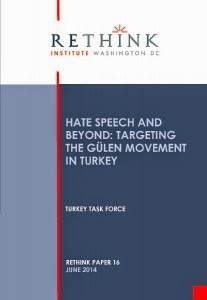On December 17, 2013, a graft probe alleging corruption among some members of the cabinet became public. Immediately thereafter, the Gülen movement (a.k.a. Hizmet), one of the largest faith-based communities in Turkey, became the target of offensive statements by Turkish Prime Minister Recep Tayyip Erdoğan. The paper argues that from the standpoint of human rights law, there is little doubt that some of the prime minister’s statements are fundamentally incompatible with the principles underlying the concept of human rights. Some of these expressions, indeed, amount to prima facie hate speech as understood by the European Court of Human Rights, the jurisdiction of which is already accepted by Turkey.
According to the European Court of Human Rights, any language which spreads, incites, promotes or justifies hatred based on intolerance, including racial and religious intolerance, is considered to constitute hate speech and is unworthy of protection under the guarantees of freedom of speech. As a matter fact, if the element of hatred is detectable at first sight, the European Court of Human Rights defines such language as abuse of freedom of expression. In this regard, some of the language used by Prime Minister Erdoğan to describe the Gülen movement – i.e. “perverts”, “hashashins”, “traitors”, “spies”, “worse than Shiites”, “leeches” and “a terrorist organization” – do indeed constitute prima facie hate speech.
A government leader’s perpetration of hate speech is unprecedented for Strasbourg jurisprudence. In case law in the European Court of Human Rights, there is not a single case in which a High Contracting Party to the European Convention on Human Rights has been convicted for failing to sanction individuals using hate speech, let alone for perpetrating hate speech itself. However, the expressions of the Turkish prime minister exhibit so much seriousness and vehemence that they tend to extend beyond the already existing contours of hate speech as drawn by the European Court of Human Rights. Not only did Mr. Erdoğan blatantly insult the movement, but he also encouraged the masses to do the same, and actually succeeded in creating mass hatred towards the Gülen movement. In the process, he put out a boycott call to exclude the Gülen movement from the layers of social life that led to repercussions among his supporters. In tandem with the boycott call, he declared that he would use the powers of the government to discriminate against the Gülen movement and started a “witch hunt.” For these reasons, in light of ECtHR case law, it is hard, if not impossible, not to consider Prime Minister Erdoğan’s expressions targeting the Gülen movement as unprecedented prima facie hate speech.
Published on Rethink Institute, June 2014
PDF version of the full analysis
Latest news, academic excerpts, commentary, book reviews and interviews on Fethullah Gulen and the Hizmet Movement (aka The Gulen Movement).
Search This Blog
Overview
Content from 164 countries/states
Categories
New Audio Podcast
Some Highlights
- Top Three Reasons Why Turkey’s President Erdogan is Obsessed with Gulen
- Turkish witch-hunt against the Gulen movement lacks one thing: Evidence
- Bill Clinton on Fethullah Gulen's contribution to the world
- Erdoğan’s war against Hizmet: Step by step
- Is Gulen Movement a religious order?
- Is the Gülen Movement a civil society initiative?
- Popular Islam – Hizmet-Gülen Movement and Fethullah Gülen
- Why do they lie about Fethullah Gülen?
- The Responsibility of the Hizmet movement
- Gülen movement is a chance for humanity, American professor says
- Gulen Movement: An attempt to represent Islam and Muslims positively
- Muslims Must Combat the Extremist Cancer
- The Place of the Gulen Movement in the intellectual history of Islam
- A Universal Islamic Phenomenon in Turkish Religious Practice: the Gülen Case
Suggested Readings
Disclaimer: Copyrights and ideas in the articles belong to their respective owners. Hizmet Movement (Gulen Movement) Blog may not be held liable from the content of articles nor their potential misuse by third parties. Articles shared are not necessarily endorsed. Links and images used in the blog posts may differ from those at their original source. Translated articles are solely intended for the convenience of the readers, and may include minor errors.

